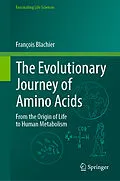This book takes readers on a journey from the very fundamental and chemical beginnings of amino acids on Earth to their role in human metabolism. It provides background on how amino acid metabolism has changed across the evolutionary tree and discusses their physico-chemical properties as well as their biochemical roles across various forms of life.
Amino acids are emerging as key players in numerous physiological functions and are being increasingly recognized as playing a mechanistic role for the communication between the gut microbiota and the host in healthy state and in some pathophysiological situations. However, understanding these associations requires a multidisciplinary approach, combining chemistry, biochemistry, physiology, nutrition, molecular/cellular biology and microbiology. This book aims to describe the science behind amino acids from their first appearance and evolutionary significance, all the way through the tree of life to humans, and then to consider how gut microbial amino acid metabolism regulates human physiology and risk in some chronic diseases. It covers key concepts such as the characteristics of different amino acids found in living organisms, their existence in the pre-living world, and their vital roles in metabolism and physiology. It also explores intriguing questions about microbial communication and the effect of amino acid-derived microbial metabolites on mammalian cells.
With this multidisciplinary approach and accessible structure, this book will appeal not only to students and researchers with a background in biochemistry and related fields, but also to non-specialists with an interest in the foundations of life at the intersection of evolutionary biology and metabolism.
Autorentext
François Blachier worked as Research Director at the National Institute for Agriculture, Alimentation and Environment (INRAe). He was deputy director of the Nutrition Physiology and Alimentary Behavior laboratory, which is one of the research units belonging to the Université Paris-Saclay/AgroParisTech/INRAe consortium. After graduating in biochemistry, he worked at McGill University in Montréal (Canada), at Brussels Free University (Belgium), and at the Institute of Animal Physiology and Genetics in Cambridge (UK). He received his PhD in Cellular and Molecular Pharmacology from Université Pierre and Marie Curie (Paris, France). His main research interest is related to the metabolism and physiological functions of amino acids in pancreatic beta cells, parotid cells, and intestinal epithelial cells. More recently, his team has worked on the metabolic activity of the intestinal microbiota towards amino acids and proteins and on the consequences for intestinal physiology and pathophysiology. He has published 180 articles (source PubMed) that have been cited over 14 000 times (Google Scholar). He has previously published 2 books with Springer, namely "Nutritional and Physiological Functions of Amino Acids in Pigs" in 2013, and "Metabolism of Alimentary Compounds by the Intestinal Microbiota and Health" in 2023.
